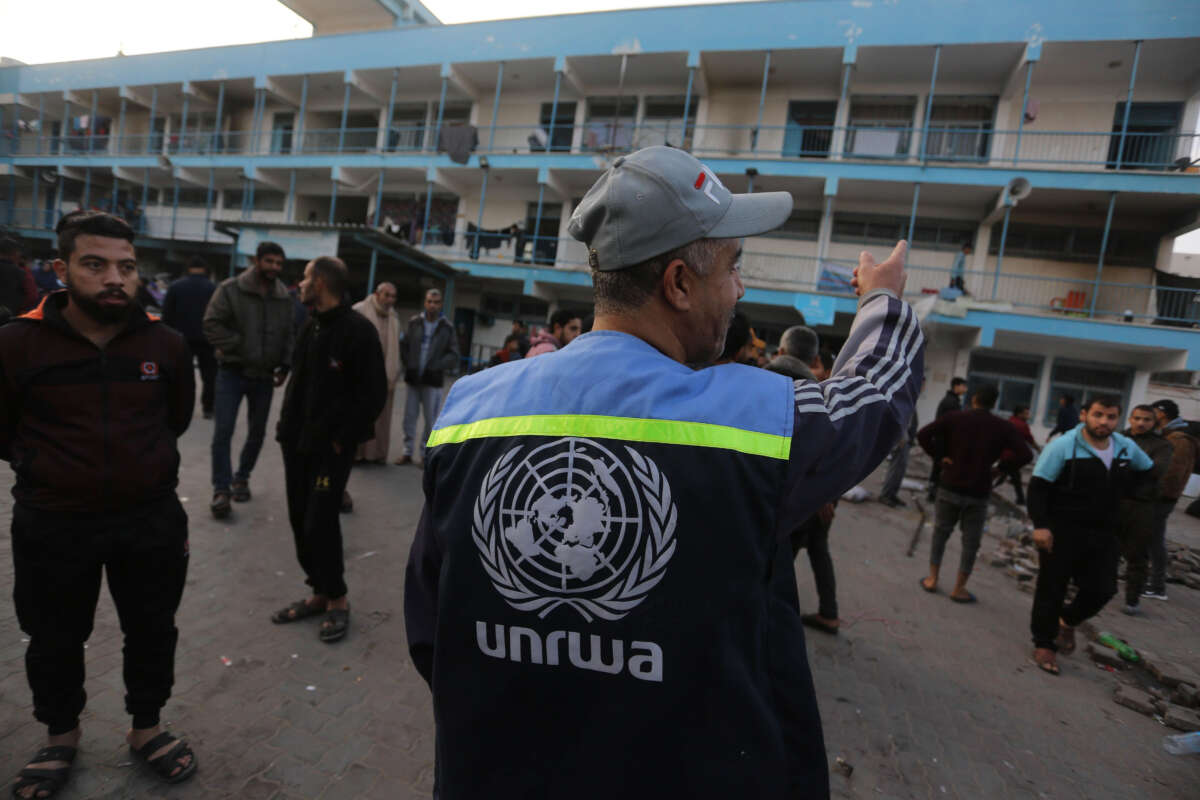Bipartisan negotiators in Congress are now seeking to make the U.S.’s defunding of Palestine’s primary aid organization permanent after U.S. officials suspended funding to the agency last month amid Israel’s genocide in Gaza, which would yank away funding for aid when Palestinians need it the most.
Buried in the bill — which contains a wide swath of draconian measures aimed at punishing and harming asylum seekers and immigrants in the US — is a provision that experts say would eliminate all funding, present and future, for the UN Relief and Works Agency for Palestine Refugees (UNRWA). The bill text states that none of the funding for the bill or prior bills can be used for any form of payment to the UNRWA.
Republicans are currently moving to oppose the package, with House Speaker Mike Johnson (R-Louisiana) saying that he won’t bring it to a vote — not because of the UNRWA provision or any substantial critique of the bill, but because they think it would help President Joe Biden’s reelection chances. Though Republicans had been pushing for harsher immigration proposals like the ones contained in the bill, they are expected to advance a standalone GOP-backed bill on defunding the UNRWA on Tuesday.
However, before Republicans turned against the bill, it was largely expected to pass when it was first released, having been negotiated on a bipartisan basis and containing other provisions widely favored across the aisle like $61 billion in aid to Ukraine and $14 billion to Israel. Importantly, Democratic leaders including President Joe Biden have expressed support for the bill, despite its compromises to the right, and it could serve as a blueprint for future similar proposals.
Instead of funding the UNRWA, the bill would redirect funding for the agency to other UN programs like the World Food Programme and UNICEF.
If the U.S. withdraws funding from the UNRWA altogether, which many Democrats and Republicans seem eager to do, it could be disastrous for Palestinians not just in Gaza, but also in the West Bank, Lebanon, Jordan and Syria. The U.S. has historically been the largest single contributor to the UNRWA; in 2022, for instance, the U.S. contributed a little less than a third of the agency’s $1.1 billion budget in 2022.
Other portions of the agency’s funding could be in danger as well, as a dozen other countries may follow the lead of the US, threatening the existence of UNRWA.
The agency is especially crucial as Israel continues to relentlessly bomb Gaza while also blocking essential goods from entering the region. The UNRWA has been coordinating a portion of what meager aid Israel allows to enter the region, as well as setting up camps and other forms of humanitarian assistance, serving as a limited but essential lifeline for many.
Agency leaders have said that the funding suspensions mean that the agency could run out of funding in a matter of weeks, threatening its entire operation. Humanitarian aid experts and progressive leaders have said that the suspensions amount to collective punishment of Palestinians in Gaza.
“The plain reality is that UNRWA’s humanitarian role in this crisis is indispensable and cannot remotely be replaced by any other aid organization,” a coalition of aid groups, including Oxfam and Save the Children, wrote in a joint statement released this week. “Other aid agencies cannot replicate UNRWA’s central role in the humanitarian response in Gaza, and amidst the current crisis many will struggle to even maintain their current operations without UNRWA’s partnership and support.”
